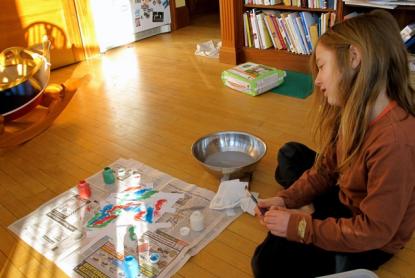A Sunday morning in New England, toward the end of January during the midwinter arctic blast that has temps barely pushing plus zero at nearly eight AM; it is beyond cold. There is enough snow piled about that driving around a corner you can connect with your inner bobsledder. All that snow—and the ice underneath—is courtesy of three storms within a week and a half (complete with three snow days, and MLK Day tossed in for good measure). Here’s another way to say what it’s like to live in New England during a deep freeze, with three snow days in two weeks plus federal holiday, a storm looming ominously (and attendant snow day rumors): it’s kind of white and bright and emotionally precarious.
I had scheduled a very rare day entirely out of the house for Friday: meeting-interview-exercise class-bodywork-tea with friend. In order to finesse this, I’d lined up requisite babysitting. Then came the robocall—our city and our school system are enamored, perhaps overly so, with their automated calling capabilities—at 5:45 AM that school had been cancelled. My heart sank a tiny bit. The storm was to end by ten. I was walking to the meetings and the exercise class. I hoped against hope everything was on and the babysitter might just make it.
OMG, nothing and no one cancelled! I got to spend the day focused on preservation of arts’ space, the Iraqi Children’s Art Exchange, stability ball class, my aching shoulders and getting to know a new friend better. It was just like the day I had planned.
Before I left the house, I wrote—giddily, to be sure—on Facebook that so long as the house was standing at the end of the day and no one was injured I really couldn’t care less about what anyone did all day long.
Sometime in the middle of that busy day, it dawned on me that I’d never once “missed” a snow day. I am a work-at-home mama and on snow days, that essentially translates into stay-at-home mama.
**
Before I had children, I read an interview with writer Marian Thurm—I think it was in the New York Times—and she described how she walked her child out of the house to “go to work” and then the child was escorted to preschool. Thurm walked back inside to the child’s bedroom and worked all day on the bottom bunk of the bunk beds. The child never knew her mother was home the whole time.
I bring this up, because after reading that article, I secretly figured it was possible to work like that at home—undistracted and not distractible—if you so desired. Or, really, I guess what I mean is if I so desired. Turns out I am not a totally tune everyone out mama and thus in fifteen years I’ve never before missed a snow day and somehow never before realized how distracted and distractible my fifteen years’ of parenting has made me, as a worker. I work, but I am no Marian Thurm. I have brought breastfeeding babies to board meetings. I’ve “balanced” work and life so that I’ve worked, but never in a sustained way does work outpace my family commitments. I’m not saying I’ve gotten nothing done in either my writing or my community-participating life. But I am not the worker, perhaps, of my dreams.
Obviously, I am very fortunate that I can determine how much I work—and whether I do certain work for money or for love. The Mommy Wars—and most of the political strife in this country right now—really boil down to the issue of privilege. For one who has the essentials—like a roof and food and health care—and more than the essentials, it’s unfathomable that we aren’t in a clear, loud national conversation about the critical task of ensuring baseline essentials for all.
**

Meantime, while writing this, I have—for the record—made three breakfasts and overseen a finger painting project, another painting project set-up and answered easily 195 questions, gotten tissues and a bottle and crackers in a bowl along with the wrong cereal spoon followed by the right cereal spoon, endured music being played (Assassins), and kept one nearly three year-old from interfering with her older brother’s painting.
And what of spring? For me, it can’t come soon enough.

